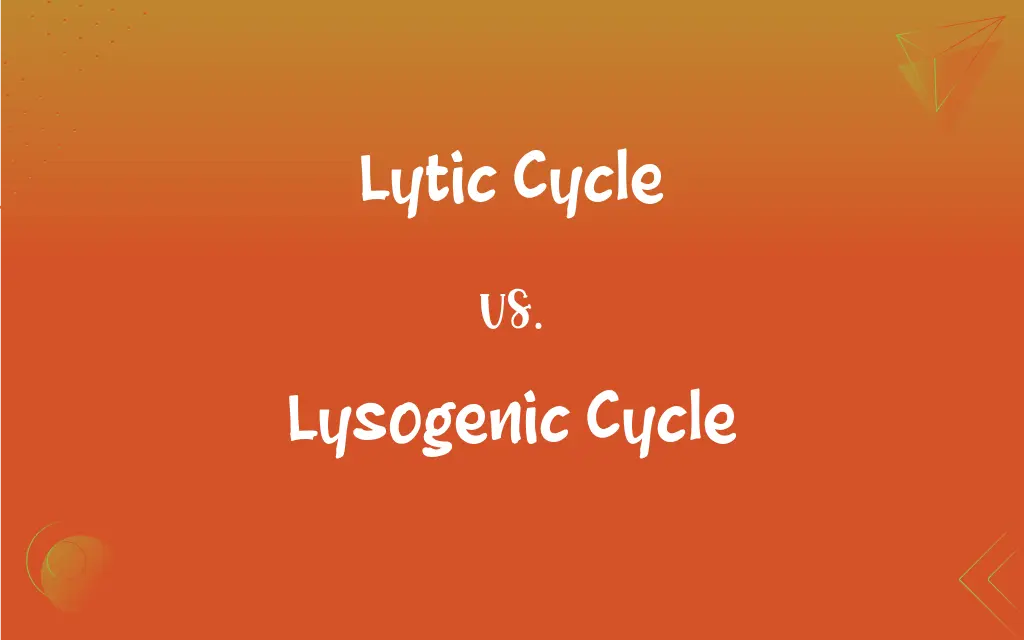Lytic Cycle vs. Lysogenic Cycle: What's the Difference?
Edited by Aimie Carlson || By Harlon Moss || Published on January 3, 2024
The lytic cycle involves viruses replicating rapidly and destroying the host cell, while the lysogenic cycle integrates viral DNA into the host's genome, replicating without destroying the cell.

Key Differences
The lytic cycle is an aggressive form of viral replication where a virus invades a host cell, takes over its machinery to replicate, and eventually causes the host cell to lyse (burst), releasing new virus particles. In the lysogenic cycle, the virus integrates its genetic material into the host's DNA, where it can remain dormant for extended periods without harming the cell.
During the lytic cycle, the host cell is actively producing new viral particles, which leads to its swift destruction and symptoms of viral infection. Conversely, during the lysogenic cycle, the viral DNA, now part of the host's genome, can replicate passively as the host cell divides, often remaining undetected.
The lytic cycle typically results in rapid spread of the virus, as the bursting of cells releases many viruses that can infect adjacent cells. In the lysogenic cycle, the virus can remain latent, sometimes for years, and is reactivated to enter the lytic cycle under certain triggers.
Viruses that undergo the lytic cycle are often responsible for acute viral infections, causing immediate health effects. In contrast, viruses in the lysogenic cycle can cause persistent infections and may be implicated in long-term health effects, like certain cancers.
The outcome of the lytic cycle is the death of the host cell and the release of new viruses, while the lysogenic cycle allows both the virus and host cell to coexist, potentially for the lifetime of the host or until external factors prompt the virus to enter the lytic cycle.
ADVERTISEMENT
Comparison Chart
Viral Replication
Rapid and destructive
Slow, integrates with host DNA
Host Cell Fate
Cell bursts and dies
Cell remains alive and functional
Symptom Onset
Causes immediate infection symptoms
Can remain latent without symptoms
Viral Spread
Quick, due to cell lysis
Slow, can reactivate under triggers
Typical Outcome
Acute viral infections
Persistent or latent infections
ADVERTISEMENT
Lytic Cycle and Lysogenic Cycle Definitions
Lytic Cycle
In the lytic cycle, viruses hijack the cell's machinery.
The lytic cycle often leads to the cell's death.
Lysogenic Cycle
It allows the virus to replicate without destroying the host cell.
In the lysogenic cycle, viruses can coexist with the host.
Lytic Cycle
The lytic cycle culminates in the host cell bursting.
This cycle is responsible for the cell destruction seen in acute infections.
Lysogenic Cycle
The lysogenic cycle involves viral DNA integrating into the host's genome.
Herpes viruses can remain dormant due to the lysogenic cycle.
Lytic Cycle
It is characterized by aggressive viral replication.
The lytic cycle's aggressive nature causes the rapid spread of the virus.
Lysogenic Cycle
It's a form of viral replication that preserves the host cell.
The lysogenic cycle is less destructive in the short term.
Lytic Cycle
The lytic cycle is a viral replication process ending in cell lysis.
Common cold viruses often use the lytic cycle.
Lysogenic Cycle
Viruses can switch from the lysogenic to the lytic cycle under stress.
Environmental triggers can activate viruses from the lysogenic cycle.
Lytic Cycle
It involves rapid production of viruses within a host cell.
The lytic cycle can lead to quick onset of symptoms.
Lysogenic Cycle
The lysogenic cycle can remain latent for extended periods.
This cycle often results in asymptomatic viral presence.
FAQs
What is the lytic cycle?
A viral replication process that destroys the host cell.
What is the lysogenic cycle?
A viral replication method where the virus integrates into the host's DNA.
How does the lytic cycle spread?
Through the rapid release of new viruses from lysed cells.
How does the lytic cycle affect host cells?
It leads to the destruction of the host cell.
What are the symptoms of the lytic cycle?
It often causes immediate infection symptoms.
Is the lysogenic cycle a fast process?
No, it's a slower and more latent process.
What happens to viruses in the lytic cycle?
They replicate quickly and burst the cell.
Can the lysogenic cycle be dormant?
Yes, it can remain latent for extended periods.
Are symptoms always present in the lysogenic cycle?
No, it can be asymptomatic.
Are all viruses capable of the lytic cycle?
Many, but not all viruses, use the lytic cycle.
Can the lytic cycle cause acute infections?
Yes, it's responsible for many acute viral infections.
What triggers the switch from lysogenic to lytic?
Factors like stress, UV light, or chemicals.
Is the lytic cycle quick or slow?
It is a rapid process.
What happens to viruses in the lysogenic cycle?
They integrate into the host's DNA and replicate passively.
Can viruses in the lysogenic cycle reactivate?
Yes, they can switch to the lytic cycle under certain triggers.
How does the lytic cycle impact health?
It can cause rapid onset of disease.
Is the lysogenic cycle associated with chronic infections?
It can lead to persistent or chronic infections.
Can a virus switch from lysogenic to lytic?
Yes, under specific conditions.
Can the lysogenic cycle lead to cancer?
In some cases, it might contribute to cancer development.
Are vaccines effective against lytic cycle viruses?
Vaccines can be effective in preventing diseases caused by such viruses.
About Author
Written by
Harlon MossHarlon is a seasoned quality moderator and accomplished content writer for Difference Wiki. An alumnus of the prestigious University of California, he earned his degree in Computer Science. Leveraging his academic background, Harlon brings a meticulous and informed perspective to his work, ensuring content accuracy and excellence.
Edited by
Aimie CarlsonAimie Carlson, holding a master's degree in English literature, is a fervent English language enthusiast. She lends her writing talents to Difference Wiki, a prominent website that specializes in comparisons, offering readers insightful analyses that both captivate and inform.






































































